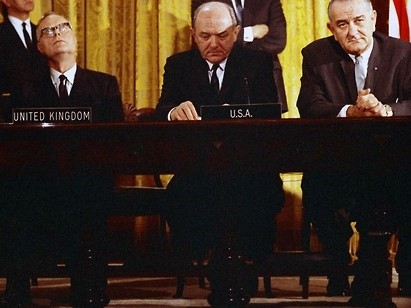Will Donald Trump break the fifty year-old Outer Space Treaty?


Today, considering the ongoing shifts in the geopolitical landscape, not to mention a space race that’s becoming increasingly crowded, it’s worthwhile to reflect on the significance of this well-respected document.
Ultimately garnering signatures from 104 states, the Outer Space Treaty, hammered out in 1967, still represents a high water mark in international diplomacy. It was created in response to the previous decade’s space advances by the Soviet Union and the United States and essentially cast space exploration going forward as a collaborative and cooperative endeavour for the benefit of all humankind.
The treaty’s principles said that the exploration of space would be “for the benefit and in the interests of all countries” and that the use of the moon and all other outer space bodies would be for “peaceful purposes.” Significantly, the treaty also imposed a ban on the weaponization of outer space, a rule which has led to half a century of relative calm in the skies.
Writing for Space Review, Space Law Advisor and graduate of Leiden University’s International Institute of Air and Space Law and the International Space University, Christopher D. Johnson calls the Outer Space Treaty “an ingenious compromise,” considering the Cold War politics of the time.
On the issue of private enterprise in space, for example, the Soviet Union was said to be in favour of only state-level exploration while the US was more partial to allowing free enterprise within the newly opened up territory. But international negotiators were able to craft an acceptable in-between which saw private exploration to be permitted yet states were thusly held responsible for any commercial activities they might authorize. “This principle, contained in Article VI of the Treaty, reflects a major compromise between the USSR and the US, and a unique innovation in international law,” says Johnson.
Here in 2017, the dynamics of space exploration have changed considerably. While the US and NASA maintain their superiority in terms of breadth and scope of current and planned space missions, there are a number of groups nipping at their heels. Nationally, countries like China, India and Japan are developing ambitious programs, while international organizations like the European Space Agency remain major players.
But the significant evolution has been in the emergence of private space programs such as Elon Musk’s SpaceX and Richard Branson’s Virgin Galactic, not to mention the number of privately-funded teams currently lining up to compete for Google’s Lunar X-Prize. The goal of space exploration has shifted, too, as many are seeing space mining as the new economic frontier, stirring up questions about private property on asteroids and the very idea of sovereignty on other bodies as laid out by the Outer Space Treaty.
NASA itself is expected to make a change in direction under the new Trump administration. Trump has said next to nothing about space exploration both during his presidential campaign nor during his first weeks in office, yet indications are that private enterprise is likely to be in favour under the new order.
The one comment on space from Trump made during a campaign breakfast in New England (in response to a 10-year-old’s question about NASA) was that although “space is terrific” and he “loves NASA,” Trump felt that there were more pressing matters to deal with at home. “We’ve got to fix our potholes. You know we don’t exactly have a lot of money,” said Trump (thus deflating the kid’s dreams somewhat, we expect).
But the so-called landing team for NASA which Trump has set down to help transition in the new government is said to be telling, in that it includes a former senior advisor for NASA on commercial space, Charles Miller, who also had previous stints consulting for private space companies like Blue Origin and Virgin Galactic. Thus, although it’s likely a mug’s game to try to predict where the current administration is headed vis-a-vis NASA and space exploration, the guess is towards more private involvement in US space missions.
Where does this leave the Outer Space Treaty? Again, who knows. But it’s perhaps hard to miss the difference in tone and ideology behind that treaty in comparison with that of the political world order of today, which, led by Trump’s bellicose, America first approach stands in marked contrast to the collaborative, peace-seeking agreement struck by world powers 50 years ago.
Why would the America of 1967 sign such an agreement? Aside from lesser efforts by the Soviets, the US stood alone (first, really) in space and from that vantage point could by rights make up its own rules, ones that were decidedly to its own benefit. Who would be there to stop them?
In fact, the proof is in the past half-century, during which the Outer Space Treaty has allowed the US – along with everyone else – the freedom to explore outer space at their will while at the same time offering “heavenly” peace and security in the process. “Long-term rationality warrants adherence to efficient systems of law,” says Johnson in the article previously mentioned. “Correctly-balanced rules help increase long-term benefits (like safety and security) that would otherwise be unattainable without a system of rules. It is this rationale that also underpins international treaty-making.”
Thus, signing onto the Outer Space Treaty meant that the US and everyone else would not have to worry about the weaponization of space, for instance, thereby giving them plenty of time to deal with all those potholes at home.
Below: What is the Outer Space Treaty & why it was developed?

